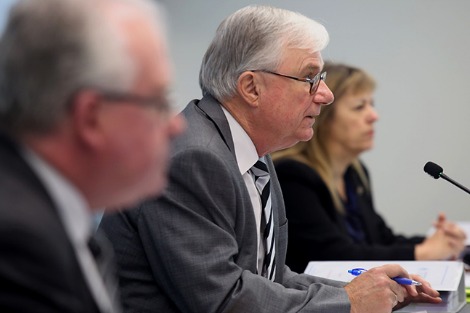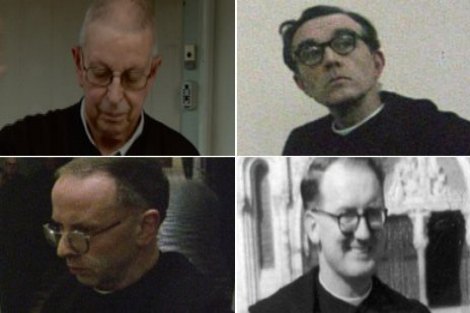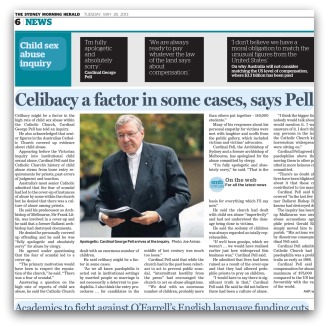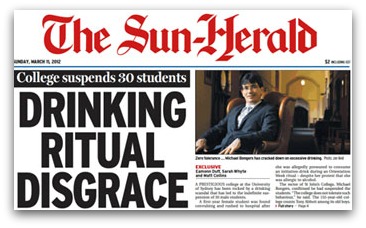Keywords: Church Sex Abuse Scandal
-

AUSTRALIA
- Neil Ormerod
- 18 August 2014
33 Comments
The recent independent redress scheme announcement by the Catholic Church's Truth, Justice and Healing Council is welcome. However it is not simply a matter for church hierarchy. Congregations need to be brought into the process of healing and reparation, which might include liturgies of lamentation and practical ways to make the church a safe place for victims of abuse.
READ MORE 
-

RELIGION
- Tim Wallace
- 03 April 2014
12 Comments
In 2004, two years into the Sydney Archdiocese's botched handling of a sexual abuse complaint against Fr Aidan Duggan, the executive director of the Church's National Committee for Professional Standards did something extraordinary: he inquired into whether Duggan, prior to joining the Archdiocese in 1974, had form. It is the only evidence of a Church official actively attempting to check Duggan's past — an attempt destined to fail.
READ MORE 
-

RELIGION
- Geraldine Doogue
- 14 January 2014
13 Comments
I wish he would invite me to be his temporary consultant, to offer him advice for his next 500 days. I'd begin by proposing a substantial Vatican-led inquiry, into why the Church has been so troubled by sexual abuse across various countries. Then I would point to the experiences of several large secular institutions, including the New York Times and US Army, that have rebuilt after crises.
READ MORE 
-

RELIGION
- Geraldine Doogue
- 24 September 2013
35 Comments
I wish he would invite me to be his temporary consultant, to offer him advice for his next 500 days. I'd begin by proposing a substantial Vatican-led inquiry, into why the Church has been so troubled by sexual abuse across various countries. Then I would point to the experiences of several large secular institutions, including the New York Times and US Army, that have rebuilt after crises.
READ MORE 
-

RELIGION
- Frank Brennan
- 04 September 2013
2 Comments
'The Towards Healing protocol is not a substitute for criminal prosecution of sex abusers. Nor is it a cheap alternative to civil liability for damages. It is a procedure available by choice to victims in addition to criminal prosecution of perpetrators or pursuit of civil damages for negligence by church authorities.' Full text from Frank Brennan's address to the Canon Law Society of Australia and New Zealand 47th Annual Conference, 4 September 2013 at Hotel Grand Chancellor Adelaide on Hindley.
READ MORE
-

AUSTRALIA
One consequence of mandatory celibacy has been the creation of a priestly mystique: a notion that the priest is a man set apart. When bishops say that cover-ups were attempts to avoid 'scandal', they are really talking about their fear of what might happen if priests were no longer thought to be special.
READ MORE 
-

ARTS AND CULTURE
- Tim Kroenert
- 07 March 2013
2 Comments
Catherine Deveney was right to point out that power, not homosexuality, was at issue in the case of Cardinal O'Brien, who resigned amid accusations of sexual misconduct. A new film by American director Steven Soderbergh also reflects on relationships based in power, and the ethical obligation of the party with the greater power not to act against the interests of the other.
READ MORE 
-

RELIGION
- Andrew Hamilton
- 28 February 2013
17 Comments
Like sex, scandals in governance attract an avid audience. So the master story of the papal election has become one of governance in disarray — of Vatican departments riven by ambition, scandal and acrimony. Even if the reports are not true, hearers begin to wonder who leaked them, and in whose interest.
READ MORE 
-

RELIGION
- Frank Brennan
- 23 November 2012
1 Comment
'Might not the chief problem with Church language in the public square be that we tend to come from a position of moral superiority, approaching those dreadfully compromised politicians who will do anything to be elected? The abuse crisis reminds us that the Church is not irreproachable.' Text from Fr Frank Brennan's presentation at the Anglican Church of Australia's Public Affairs Commission Conference, November 2012.
READ MORE
-

AUSTRALIA
- Michael Mullins
- 29 October 2012
8 Comments
The Jimmy Savile scandal in Britain shows the Catholic Church is not alone among trusted public institutions undermined by their own silence and denial. An Irish clergy abuse victims advocate has written of the hypocrisy of the BBC in its reporting of abuse crimes in the Church.
READ MORE 
-

AUSTRALIA
- Michael Mullins
- 12 March 2012
19 Comments
The Church is recognised as having tolerated abuse of children and young adults, and sometimes regarded it as character building, in connection with corporal punlshment and activities such as drinking rituals at university residential colleges. But the Catholic college at Sydney University has broken with tradition by implementing its zero tolerance policy.
READ MORE 
-

AUSTRALIA
- Michael Mullins
- 18 April 2011
16 Comments
In the wake of the defence force Skype sex scandal, former diplomat Bruce Haigh pointed out that things start to go wrong when commanding officers forget that they are there to serve, and instead act to protect their reputations. His point holds true for unions and churches.
READ MORE 